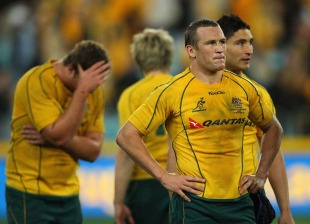|
Comment
Giteau must rediscover golden touch
Keiran Smith
September 12, 2010

Veteran Matt Giteau needs to raise his game if the Wallabies are to challenge for the sport's biggest prize
© Getty Images
Enlarge
The dust is settling on another edition of the southern hemisphere's showpiece tournament and while we salute a new champion, sadly they are again not wearing gold. Congratulations must go to Graham Henry and the All Blacks for a clean sweep, of both the second and third ranked teams in the world no less, and securing 27 points out of a maximum of 30 available. But, for Australia, it has now been nine long years since we have held the Tri-Nations trophy aloft and are currently in the midst of a record 10-match losing streak against the All Blacks. However, despite the drought the Wallabies' 2010 campaign was not entirely disappointing, far from it. There were some truly memorable moments, not least Kurtley Beale ending 47 years of hurt on the high veldt with an Eales-esque penalty goal to reclaim the Mandela Plate. But as glorious and celebrated a moment as that was there is still no hiding some flaws in the Wallabies' DNA. The most alarming character trait is their uncanny ability to somehow lose matches they have already won. In Johannesburg, Bloemfontein and Sydney the Wallabies threw away commanding leads. Thankfully an equally porous Springbok defence and Beale's nerves of steel allowed a reprieve in Bloemfontein, but to see his team implode and give up a 20-odd point lead two weeks in a row must have aged Robbie Deans by decades. The dilemma is that our greatest strength is also our kryptonite. On one hand we have a dynamic, blistering and exuberant backline, which play without fear and are capable of destroying any defence, including the All Blacks, on any given day. On the other, we do not yet have the experience or the 'rugby nous' to know how and when to control the tempo of a contest and grind the opposition into the turf. This is why Matt Giteau is so important and where his on-field leadership needs to shine through. With 87-Tests he has more than the majority of the new look backline combined and after Quade Cooper, Will Genia, James O'Connor and the rest have unleashed the storm, he needs to take the reins and call the play. A common characteristic of the past three Tests is the Wallabies lost their way after dominating the early exchanges. This is where Giteau, as a senior player, needs to step into the breach and be a leader.
Most pleasing for Australian fans in 2010 has been the return to a running game, with some of the tries scored this season the best in years. The architect has been none other than Cooper, who belatedly re-signed last week for the 2011 season. Make no mistake, having the 22-year-old put pen to paper for another year is a massive boost for both the Wallabies and the Australian Rugby Union. It was evident his decision to stay was a line-ball call and it took the personal involvement of CEO John O'Neill to help broker an agreement and avert what would have been a very public loss of face for the ARU as a consequence of losing one of the best prospects in the country to a rival code, just one year before rugby's showpiece event. However, with the deal only for one additional year, the circus surrounding the next negotiations may yet be an inconvenient distraction in the lead up to the World Cup itself. Let's hope not. Despite Cooper's talent, the undoubted star of the Wallabies' season was David Pocock. His rise to become a key player in just one season has been nothing short of remarkable, more so given the boots he needed to fill were none other than George Smith's, a living Wallabies legend. The 2010 season also showed James O'Connor and Kurtley Beale prove they belong at this level and once Digby Ioane, Peter Hynes and Drew Mitchell return to the mix, Deans will have a difficult, yet not an unwanted, dilemma of selecting a back three. Up front, Ben McCalman at No.8 looked comfortable in the rarefied atmosphere of Test rugby while Salesi Mafu and Saia Faingaa also continue to improve. While the young members of the Wallabies squad dominate the plaudits and the press it is one of the elder squad members that Robbie Deans' has come to most heavily rely on. The continued renaissance of Nathan Sharpe has surprised many given he was on the outer of Deans' plans ahead o the 2008 Tri-Nations. Thankfully, for one of the true gentleman of the sport, he recovered the form that now makes him a lynch pin in the Wallabies pack, especially in the long term absence of James Horwill. Sharpe's strong influence over the line-out was badly missed after he left the field with injury in Johannesburg and for the Wallabies to be a viable force at the line-out the 88-Test veteran needs to stay healthy. Despite ten defeats and counting to our fiercest rivals, the Wallabies are getting closer to breaking the spell and if the final three Tests of the Tri-Nations are any indication the Wallabies 'blitzkrieg' style of play makes them the masters of their own destiny. All that is now required is the resolve to match the talent. Then we may well have a gold jersey lifting the silverware. © Scrum.com
| |||||||||||||||
Live Sports
Communication error please reload the page.
-
Football
-
Cricket
-
Rugby
-
- Days
- Hrs
- Mins
- Secs
F1 - Abu Dhabi GP
Abu Dhabi Grand Prix December 11-131. Max Verstappen ()
2. Valtteri Bottas (Mercedes)
3. Lewis Hamilton (Mercedes)
4. Alexander Albon ()
5. Lando Norris ()
6. Carlos Sainz Jr ()
-
ESPNOtherLive >>
Golf - Houston Open
Snooker - China Open
Tennis - Miami Open

